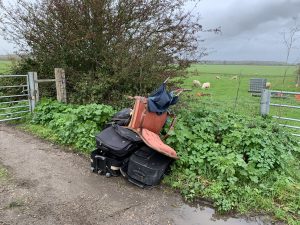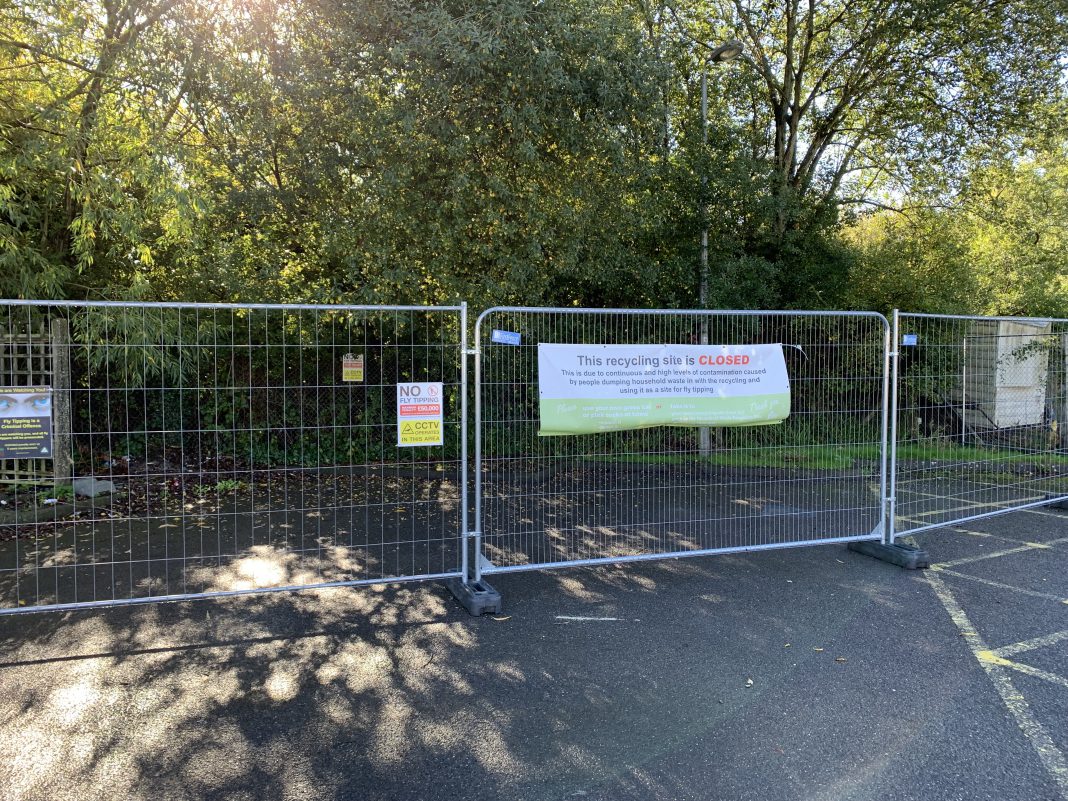Jempson’s, Peasmarsh recycling site closing
The recycling site at Jempson’s superstore, Peasmarsh, TN31 6UY will close on 7th December 2022. This is due to the continuous high levels of contamination caused by people mixing household waste in with the recycling and using it as a site for fly-tipping. Please use your green recycling bin or pink sacks at home or take it to your nearest recycling centre (local tip) such as the Pebsham Household Waste Recycling Site or Mountfield Household Waste Recycling Site. The Salvation Army banks will remain for clothing and book donations
(Rother District Council 18/11/2022)
It’s easy to do, isn’t it? A service is not working, it costs money … so let’s cut our losses and take it away. Remind you of a swimming pool? But, in the case of reuse, recycling and waste disposal, we need to do a lot more, not less, and simply withdrawing services without thinking through the consequences and what may be required for the future makes no sense. The reason given for Rye & Peasmarsh, along with other local recycling sites, is based around “mis-use” and fly-tipping – and nobody can deny it was a mess. But why was it in such a mess? How come some councils and communities seem to manage local reuse, recycling, and waste disposal effectively? Closing these types of facilities, as well as causing inconvenience for residents, sows the seeds for increased uncontrolled fly-tipping – as seen this week down Camber Road.

The whole process of effective management of used products and waste materials is a complex business, and it’s not getting easier – for households, businesses … or councils. It is essential that every part of our society understands their responsibilities in this vital area and that service providers (Rother District Council and others) match the changing needs of society to ensure we protect our environment.
First, we need to understand, support and utilise the services that waste disposal providers offer, largely through Rother District Council (RDC). In June 2019 a new contract was agreed with Biffa Municipal for waste collection, while recycling and waste disposal are handled by Veolia South Downs, designed to match the present and future needs of the area. To be fair, a wide range of “free” and “paid for” services, such as bulky waste, are available (see links below) … and the first imperative is that we use what is provided. This requires effective promotion of services by RDC, East Sussex County Council and their contractors. Information is available on the web (if rather dated at times) but, as we know, this by no means reaches everyone and other forms of promotion must be used as part of an overall plan. Active reuse and recycling only comes through effective engagement through multiple channels both to support current and future services e.g., direct to households, in the community, via businesses, and via education of the younger generations in our schools & colleges.
Secondly, we need to agree how to move forward … and that does NOT involve simply closing important facilities without appropriate consultation. In the absence of local services for the disposal of materials not collected at kerbside, there will be the likelihood of increased illegal waste disposal in the open environment e.g., fly- tipping. All this does is push the problems elsewhere – either forcing people to travel long distances to access services (if indeed they can even get there) or causing reusable and recyclable items to become waste. This at a time when we need to reduce consumption of new materials and products drastically. Continuous dialogue should be in place between local communities and businesses and councils and their contractors to continue to develop and improve a comprehensive reuse, recycling, and waste disposal programme for the Rye area. In addition, Rye, as a major tourist destination, also needs to address the disposal of recyclable items and waste from our visitors. We are exceptionally fortunate to have Shane, energetically patrolling our streets and keeping them clean – along with several volunteer programmes. But where do visitors put recyclable items as they visit us and then leave? Could we at least have bins near the station and other tourist centres that allow the splitting of waste and recyclable materials? Our voluntary beach cleaners can certainly provide evidence of extensive pollution of our marine environment by recyclable items. Other areas for attention include, electrical items, clothing/textiles, reusable furniture, books etc… reuse and recycling. Food waste collection should be introduced at the earliest opportunity. The Environment Act 2021 requires Councils to introduce food waste collections by 2024/25 at the latest.
Finally, there are some local authorities and their respective waste contractors partnering with reuse organisations – one example of a coastal authority doing this is Broadland & South Norfolk with Veolia (same contractor providing recycling in Rye). In this case, the council and Veolia work in partnership with Emmaus, a homeless charity, to re-use items collected through its bulky waste service. If the items collected are not suitable for reuse, they will either be recycled or sent for disposal. But of course, many people, especially now, can’t afford “special” collections or have no way to get to Mountfield in Battle so why can’t we have a once-a-week CCTV monitored container in Rye allowing reuseable items to be left and then hopefully rehomed by anyone who wishes to take them. Leftovers can then be disposed of in a controlled manner.
As with many sustainability discussions, what starts as a seemingly straightforward issue to be solved soon develops into a frighteningly complex set of challenges. This is the point where people give up, close facilities, and begin to believe that nothing can be done, and that individual effort is pointless. At the other end of the scale, a simple internet search reveals countless reuse, recycling and waste disposal services in our area – creating some confusion as to what to do.
We cannot allow this to happen – so let’s break it down into two key actions:
1) Councils must continue to PROMOTE, and all of us must USE, the reuse, recycle, and waste management systems that are currently in place in an appropriate way. In parallel, all of us, both individuals and businesses, need to educate ourselves to take responsibility for increased recycling and waste reduction
2) There must be a continuous dialogue between all parties involved; community, businesses, councils, contractors, service providers and volunteers to have a joined-up approach to maximise sustainability and environmental protection. This can lead to the planned introduction of new domestic and business services that will be well-used (and not abused) and the better use of services that are already in place. An obvious start would be a secure bin for electrical items only, returning scarce materials into the supply chain.
Something perhaps for our town council to stimulate and coordinate as part of an overall strategy for a “Sustainable Rye” programme? Why not take a leadership role in this vital area for all of us? Let’s not give up, but rather use the services we already have as effectively as possible – while implementing new programmes matching local community and business demand.
Further information can be accessed as follows:
Please feedback your comments and ideas so that we can build more momentum for sustainability in the Rye area
Image Credits: Peter Connock .



